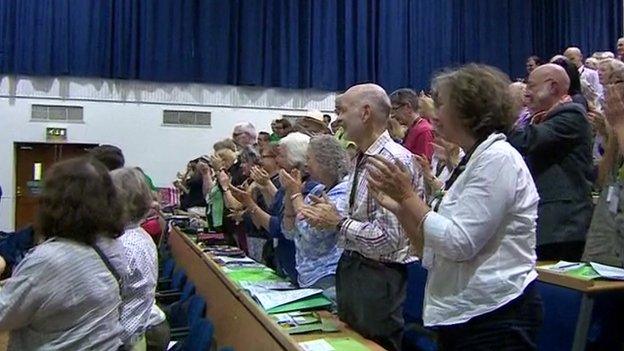Green Party calls for £10 hourly minimum wage by 2020
- Published
Green Party leader, Natalie Bennett: "We say that if you do business here, if you get your profits here, you should pay taxes here"
The Green Party of England and Wales is calling for the minimum wage to rise to £10 an hour by 2020.
In an address to Greens' autumn conference, party leader Natalie Bennett said Britain was a low-wage economy and people deserved "a decent return on their labour".
Under the plans, wages would rise by £1.15 to £7.65 an hour next year before increasing each year until 2020.
The party also proposes a "wealth tax" on those with assets of more than £3m.
The party, which currently has one MP, is promising a "progressive alternative" to the austerity agenda which it says the other Westminster parties have all embraced.
'Living wage'
Under its plans, everyone over the age of 16 would earn a minimum of £10 an hour by 2020 and the current age-based differential rates would be abolished.
The minimum wage for workers over 21 is set to rise to £6.50 next month, the first real-terms cash increase since 2008. Rates for 18-20 year olds, under-18s and apprentices are set to go up to £5.13 an hour, £3.79 an hour and £2.73 an hour respectively at the same time.

The party will field a record number of candidates at the next election
MPs from all parties have called for the UK to move towards a "living wage", which campaigners have calculated to be £7.65 an hour outside London and £8.80 an hour in the capital.
Ms Bennett, an Australian-born former journalist who was recently re-elected as leader, told delegates in Birmingham that the policy showed the Greens were "the party of real change, the party with plans and policies for how to transform our economy so that it works for the common good".
Earlier, she told the BBC that the "gradual, plannable increase" her party was proposing would benefit 5.2 million people and rejected claims the move would cost jobs.
"We are not talking about a sudden increase," she told the BBC News channel.
"What we really have to do is rebalance our economy. At the moment, wealthy individuals and particularly big multinational companies aren't paying their taxes and aren't paying adequate wages.
"Britain is a low-wage economy. We have to allow people to get a decent return on their labour."
'Not stinging'
Ms Bennett also outlined plans to ask those with more than £3m in assets to pay an annual levy of between 1% and 2%, saying they should put back more into the economy.
"This means £30,000 to £60,000 [a year]. To most of us, that sounds like a lot of money. To the wealthy, it is not very much money.
"We do not regard it as stinging. People have made their wealth from the whole of society and if they pay back some of that wealth they get a better society instead of the dreadful austerity cuts we have seen to public services which have done such terrible damage."
The Greens have sought to position themselves to the left of Labour and the Lib Dems by adopting policies such as the renationalisation of the railways, curbing private NHS work.
She said such policies had "massive support" and the party was offering a "complete package" to voters who believed the UK's current economic model was "broken and unsustainable".
'Reboot of society'
Ms Bennett dismissed suggestions it was downplaying its core environmental message, saying the party was in the front line of opposition to fracking and confronting climate change.
She challenged David Cameron to personally attend the UN climate summit in New York at the end of the month. It has been reported that the leaders of China and India will both skip the event.
At their four-day conference, the party will also debate plans to toughen up the rules on tax avoidance and change media ownership laws.
The Greens won almost 8% of the UK vote in May's European elections, gaining a third MEP.
The party also says it is confident of holding the parliamentary seat it won in Brighton in 2010, when former leader Caroline Lucas became its first elected representative in Westminster, and had a realistic chance of winning seats in Norwich and Bristol.
Ms Bennett said the party intended to put up candidates in 75% of parliamentary seats.
- Published5 September 2014
